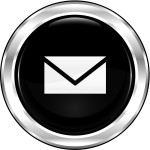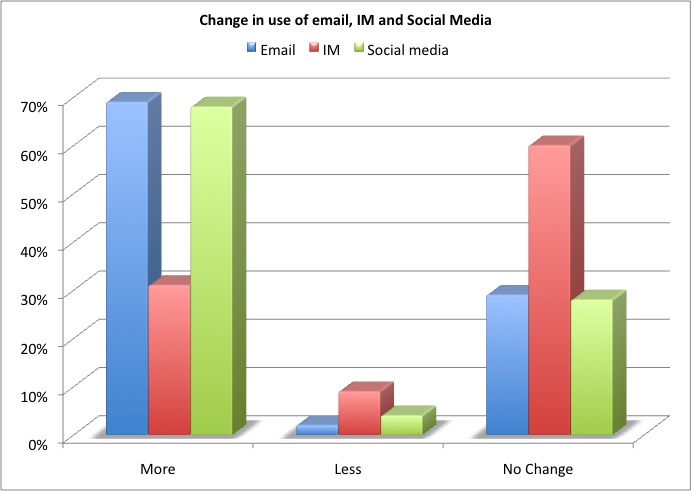Early findings of new white paper on future of email (due out in February). Email celebrated its 41st birthday recently, yet despite its age new research shows that its use is unlikely to wane significantly for at least the next decade. What should be your email strategy?
Tags: email management training, email overload, future of email
Did I miss not having any email yesterday? What was the effect on my work-life balance and business? Would there be chronic email overload the next day?
Normally I check my email first thing in the morning with a coffee in hand from one or other of the available devices (ipad or Mac). However Wednesday was No Email Day. Initially I felt at a loss. That day, I was hosting a guest at an important lunch event meeting and second there was some urgent work to finish. Not checking my inbox gave me back an hour to be properly prepared.
During the day I did cheat a couple of times and ask our Office Manager to check my inbox. She dealt with the really urgent messages which left me to focus on and complete the pressing client work. Normally I check my emails before switching off as many of my clients are on different time zones. However no one balked at a reply 24 hours later, No contracts were lost, no clients deserted me. The plus, time to read a book and get an early night.
For me even as an email management guru the key lessons were:

Mesmo Consultancy’s recent studies show that email is here to stay for at least another five years. The key to using email effectively is to take control and rule the inbox rather than let it distract and rule your day. That may mean some email management training in the new year.
Tags: email management training, email overload, Mesmo Consultancy, No Email Day
Feeling under the cosh with email overload and trying to reach inbox zero? 12-12-12 is the date for the ‘Concert for New York’ to raise money for those still effected by the aftermath of hurricane Sandy. Having been to NYC recently and experienced some of the devastation, worrying about our email seems quite trivial set against those who lost everything when Sandy hit.

Nonetheless, for those who are struggling to manage their email more efficiently help is at hand as 12-12-12 is also No Email Day. How can that possible help you ponder. Surely people will just save all their emails for the next day. That would be to miss this glorious unique opportunity to step out the inbox and review just what you are achieving when you send an email.
Email is only one of a burgeoning range of media. Yet we default to email whether through laziness, habit, addiction or lack of knowledge and skills about how to use the alternatives.
On No Email Day, before you hit send ask yourself:
The other great ways to use No Email Day are first, clear out of your inbox all the old and irrelevant emails which are of no value whatsoever to either you or your business. This might also highlight the second positive action, get some email management training to help you be more efficient.
No one is suggesting we abandon email indeed far from it. However, just once in a while it pays to ‘dry-out’ and stop taking the drug. Click here to check your current level of email addiction and how you can lower it and be more efficient.
Think about those caught up in Sandy and who lost power never mind email. They and their business survived with no visible impact to the bottom line.
One No Email day – with no new mail alerts here is an opportunity to develop better more creative ways to communicate whilst at the same time reducing the level of email overload.
Tags: 12-12-12, email management training, email overload, No Email Day, Sandy
The CIPD annual survey for well being shows that sick leave has fallen by nearly a day. Good news. The bad news is that stress and muscular skeletal problems (back pain RSI and eye strain) are two of the main reason for taking sick leave. Indeed cases of ‘ipad shoulder’ have now been reported. Email overload is still a major contributor to stress levels, not to mention the time spent at the inbox slumped over a keyboard which rises the risk of muscular skeletal problems.
Some postulate that email is in decline and hence we might hope that is email overload and it’s twin sister ’email stress’. The main reason given for the decline in email is the rise in use of social technologies like SharePoint, instant messaging (IM) and alike.
email is the rise in use of social technologies like SharePoint, instant messaging (IM) and alike.
Our recent survey on the ‘state of the inbox’ for the ITDF Autumn Conference revealed that email traffic is far from declining. Mesmo Consultancy like others are witnessing a dramatic increase. Business users now receive on average 77 emails per day which represents a rise of 26% over the last few years. Interestingly however, most feel that only 47% of these emails are necessary. Dealing with the unnecessary emails (excluding spam) is now costing organisations nearer 31 days per person per year in comparison to the 21 we witnessed a few years ago. So much for the push to lean and mean and improved efficiency.
Is your organisation paying too high a price for the pleasure of using email? Click here to check how much email overload is costing you in lost productivity.
So what of all the talk about social technologies being the nirvana to solve all the challenges which email possess? Our study revealed that about half the participants are using such technologies but they are not truly embedded in many as a replacement for email. Discussions at the ITDF supported this finding.

Haystacks by Monet
Social technologies bring with them their own set of challenges not least more emails as alerts to new postings etc. Then there is the information overload as more people feel they must share ever more information. It takes a skilled knowledge worker to pick out and pull in just what is really relevant. It’s akin to finding a needle in a haystack and is a skill few either possess or are taught.
Piling social technologies on top of email is not the solution. It just adds to the information overload and ramps up even further the stress and time we need to spend slumped over our keyboard.
One solution to driving down stress related sick leave is to implement such technologies as part of the information and communications strategy. However users must also be properly educate about when, where and how to use these technologies and email properly. Not surprisingly less than a third had any education and training in how to use effectively email and social technologies. (This is very similar to previous findings.)
We have commented on the effective use of IM and there will be more in the next blog. Meanwhile, we would be delighted to talk to you about how we can help you drive down and out the pernicious 21st century office disease of email overload and the associated stress.
Our current research into the future of email reveals that information overload is increasing. What is your organisation doing to help people use email and social technologies effectively to reduce email and information overload and hence time wasted at the computer?
Tags: email management training, email overload, email stress, future of email, Instant messaging, Mesmo Consultancy, social technologies
I chose to disconnect last week whilst on leave. No email, no social media. Running the business (and me) was delegated to our very able Administrator. We agreed a process to minimise the post vacation email overload. Rules were set before leaving to folder all known lower priority emails (eg newsletters).
Meeting request would tentatively accepted. How often have you as a PA spent time arranging meetings in bosses absence and they return and have different priorities. One executive once said he felt his PA saw her role as filling up his diary with meetings which he and she then had to  undo as his priorities changed. How often does that happen to you when on leave? Used in this context ‘tentative’ takes on a new and useful function.
undo as his priorities changed. How often does that happen to you when on leave? Used in this context ‘tentative’ takes on a new and useful function.
Otherwise, If something was ultra-urgent we agreed she would call/text me.
On the second day sitting having pre-dinner drinks how did I feel watching the three others all with their heads in their iPhones and Blackberrys? Certainly not left out. Rather the reverse: included in the here and now and able to people watch and enjoy the gentle lapping of the waves as I relaxed and stayed calm. I can only image this must be what it’s like for a reformed alcoholic watching others drink whilst they nurse a lemonade.
A huge plus was the extra time to read instead of feeling I should decamp early from the pool and go and deal with the day’s email tsunami. The book was recommended by a colleague. I wanted to email and say how wonderful it was. But what value did it add for either of us? Had I done so there would have been an email chain which wasted both our times and added to the email overload.
Knowing the business was in safe hands was a wonderful feeling. Although one worry was that my personal emails come in on my work address. It is worth separating business and pleasure, but as Steve Jobs famously said he had only one email address. I make this work for me too. There is a Hotmail address but that is only used for signing up for white paper and special offers etc. None of which is life changing if not read for a week.
What of my social diary – golf matches and alike? Our Administrator dealt with any that looked like they required a response. So no lost golf games or party opportunities! Two years ago such arrangements were nearly all done by phone. Now of course it’s email, although some friends (and relatives) say they still prefer to talk. In some ways social engagements were better managed as there was time to think and consider instead of feeling one must make an instant response.
I was tempted to log in during the week and join in when everyone else had their heads in their iPhones etc, but a glass of whisky and the urge evaporated. After all having delegated, what would that say about the trust placed in our Administrator? Furthermore, why did I want to disrupt my calm mind. Also, previously I have made poor decisions when in holiday mode through lack of context and having all the necessary information to hand.
At the airport again the urge to hit connect welled up. As in my previous blogs my advice for dealing with the holiday email tsunami is talk before checking the email to prioritise and save trawling through stuff which does not merit your immediate attention. In my case it would be talk and read the ‘read me first email’ as my first day back in the UK was Saturday. I was two hours ahead of the UK so my briefing email would not be ready until we were in the air. Some food and drink soon took away the urge to log in.
On my return as expected, the junk had been trashed and the remaining messages prioritised.
Not logging in was as to paraphrase the great Diana Athill ‘ like excess cargo which needed to be dumped’. I came back feeling more relaxed and able to see the big picture again. Also an a huge bonus, no post holiday email overload and it was very easy to reach inbox zero on day one of my return.
Of those in the party that did log on. One person was asked why they did so when the manager did not? One said they were paid to be available to their clients at all times and yes, someone did want to meet them on Monday. Could it have waited? Probably yes. Did I miss email, twitter etc? No. In fact it has left me re-assessing the value of some of these tools.
What is your experience of no email days/weeks when on leave?
Tags: email addiction, email free vacation, email management training, email overload, inbox zero